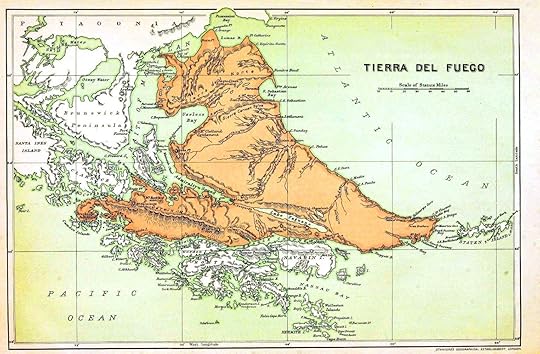Considering Jemmy Button (& Andrea Barrett's thoughts on the subject)
I've been thinking lately about Jemmy Button.
In 1830 the man who became known as Jemmy Button was taken, in apparent retaliation, with three other Fuegian people from Tierra del Fuego by Capt Robert Fitzroy of the HMS Beagle after one of the ship's launch boats was taken. They returned to Britain with the ship where one of them passed away from smallpox. In 1831 when the Beagle departed on another voyage (this time with Charles Darwin onboard), Fitzroy made the decision to take the three Fugians back home. It was not a warm welcome at first - at all - but eventually, after some difficult times, Jemmy and his friends were apparently integrated back into the village. The missionary that accompanied them was not so lucky (he demanded to leave with the Beagle when it stopped back by, apparently the grand plan to convert the whole village did not work out) but Jemmy Button is an example of a native who left his home and albeit quite painfully, found his way back. I knew his story but because of Andrea Barrett, I've been thinking about him a lot lately.
I have been reading a lot of Andrea Barrett these days. Her sense of history is what I'm trying to tap into and the way she blends science so effectively into her stories (and novels). It's her attention to detail that is really appealing to me as I try to find the right balance of detail in my own current (nonfiction) work on AK. In her short story "Soroche", (from Ship Fever), Barrett writes about a woman, Zaga, who moved away from her family's social and economic classes after she married. When her husband dies and she gives away/loses the fortune he left her, she struggles to integrate back into the people she left behind. Sometimes, it doesn't have to be miles to make the distance great.
Zaga remembers a conversation she had years before with a doctor about Jemmy Button. There was one exchange in particular she recalled:
Think of that. Jemmy Button: captured, exiled, re-educated; then returned, abused by his family, finally re-accepted. Was he happy? Or was he saying that as a way to spite his captors? Darwin never knew.
Barrett wants the reader to question if Zaga is happy - if she was happy in the strange new world with her husband (who she loved) and if she will be happy now, with her family who distrusts her because she left. Can you go that far away and still be who you are - still be who you think you are even when you go back home?
I think about that a lot.
Templar Books has a picture book due out in a couple of months, called Jemmy Button , written by Alix Barzelay with illustrations by Jennifer Uman and Valerio Vidali. It is gorgeous to look at and the illustrators (who collaborated across the ocean without a common language) have done an outstanding job of showing Jemmy as someone apart in England, even when he is in the midst of a crowd. Barzelay's text tells the basic story although she spares young readers the drama of his return. "The island had remained the same," she writes, "as had the forest and the sky and the ocean." For young readers this is the Jemmy they want to know but it is of course not the whole story. The island had not changed but Jemmy had, he had become someone named Jemmy Button after all, and returning home was not as easy as walking on the same soil again.
Alaska is pretty far from the rest of the world; returning home from there isn't so easy either. So yeah, thinking a lot about Jemmy Button and Tierra del Fuego lately, while writing about Russ Merrill and more in Alaska.
[Interior shot from Jemmy Button after he arrives in London.]





